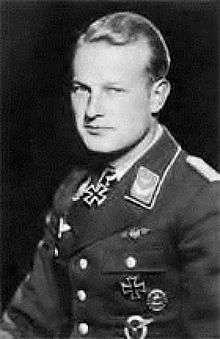Ernst Buffa
| Ernst Joachim Valentin Gustav Buffa | |
|---|---|
 | |
| Born |
14 February 1893 Oppeln |
| Died |
19 September 1971 (aged 78) Traben-Trarbach |
| Allegiance |
|
| Service/branch |
Deutsches Heer (1914–18) Reichswehr (1919–35) Luftwaffe (1935–45) |
| Years of service | 1912–45 |
| Rank | Generalleutnant |
| Commands held |
Flak-Regiment 104 (mot) 12. Flak-Division 21. Flak-Division |
| Battles/wars |
|
| Awards | Knight's Cross of the Iron Cross |
Ernst Joachim Valentin Gustav Buffa (14 February 1893 – 19 September 1971) was a highly decorated Generalleutnant in the Luftwaffe during World War II. Son of Franz Freiherr Buffa von Lilienberg und Castellalt, Baron of the Holy Roman Empire, he enlisted in the German army in 1912. He entered the Military Academy of Berlin in May 1916. During World War I he was sent to the Western Front. He was also a recipient of the Knight's Cross of the Iron Cross. The Knight's Cross of the Iron Cross was awarded to recognise extreme battlefield bravery or successful military leadership. Ernst Buffa was taken prisoner by American troops in 1945 and was held until 1947, retiring to live in Argentina in the province of Cordoba where he went on to write about his experiences during the war. He died in 1971 in the village of Traben-Trarbach at 78 years old.
Awards and decorations
- Iron Cross (1914)
- 2nd Class (27 January 1915)
- 1st Class (18 January 1917)
- Ottoman War Medal (Harp Madalyası), better known as the "Gallipoli Star" or the "Iron Crescent" (20 October 1917)
- Honour Cross of the World War 1914/1918 (11 January 1935)
- Wehrmacht Long Service Award 1st to 4th Class (2 October 1936)
- Anschluss Medal (1 September 1939)
- Sudetenland Medal with Prague Castle Bar (9 July 1940)
- Iron Cross (1939)
- 2nd Class (19 May 1940)
- 1st Class (3 June 1940)
- Anti-Aircraft Flak Battle Badge
- German Cross in Gold (9 November 1943)
- Knight's Cross of the Iron Cross on 5 September 1944 as Generalleutnant and commander of 12. Flak-Division(mot.)[1]
References
Citations
- ↑ Fellgiebel 2000, p. 127.
Bibliography
- Fellgiebel, Walther-Peer (2000) [1986]. Die Träger des Ritterkreuzes des Eisernen Kreuzes 1939–1945 — Die Inhaber der höchsten Auszeichnung des Zweiten Weltkrieges aller Wehrmachtteile [The Bearers of the Knight's Cross of the Iron Cross 1939–1945 — The Owners of the Highest Award of the Second World War of all Wehrmacht Branches] (in German). Friedberg, Germany: Podzun-Pallas. ISBN 978-3-7909-0284-6.
- Patzwall, Klaus D.; Scherzer, Veit (2001). Das Deutsche Kreuz 1941 – 1945 Geschichte und Inhaber Band II [The German Cross 1941 – 1945 History and Recipients Volume 2] (in German). Norderstedt, Germany: Verlag Klaus D. Patzwall. ISBN 978-3-931533-45-8.
- Scherzer, Veit (2007). Die Ritterkreuzträger 1939–1945 Die Inhaber des Ritterkreuzes des Eisernen Kreuzes 1939 von Heer, Luftwaffe, Kriegsmarine, Waffen-SS, Volkssturm sowie mit Deutschland verbündeter Streitkräfte nach den Unterlagen des Bundesarchives [The Knight's Cross Bearers 1939–1945 The Holders of the Knight's Cross of the Iron Cross 1939 by Army, Air Force, Navy, Waffen-SS, Volkssturm and Allied Forces with Germany According to the Documents of the Federal Archives] (in German). Jena, Germany: Scherzers Militaer-Verlag. ISBN 978-3-938845-17-2.
External links
- Ritterkreuztraeger 1939-1945
- World War 2 Awards.com
- Ernst Buffa @ Axis Biographical Research at the Wayback Machine (archived October 28, 2009)
| Military offices | ||
|---|---|---|
| Preceded by None |
Commander of Flak-Regiment 104 (mot) 1 November 1939 – 5 June 1940 |
Succeeded by Hermann Lichtenberger |
| Preceded by Generalleutnant Gotthard Frantz |
Commander of 12. Flak-Division (mot) 21 December 1942 - 25 April 1944 |
Succeeded by Generalleutnant Werner Prellberg |
| Preceded by Generalleutnant Kurt Steudemann |
Commander of 21. Flak-Division 6 June 1944 - 30 November 1944 |
Succeeded by Oberst Erich Gröpler |